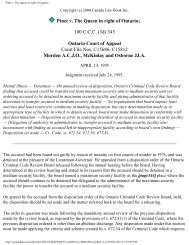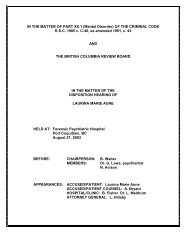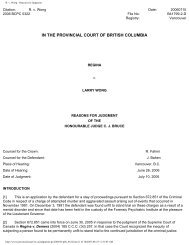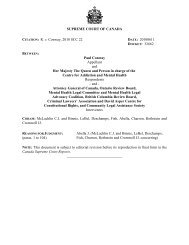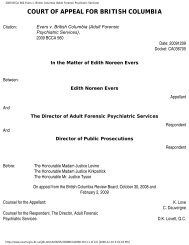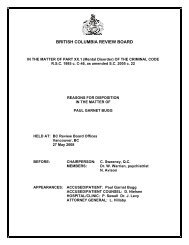R. v. Cuerrier - British Columbia Review Board
R. v. Cuerrier - British Columbia Review Board
R. v. Cuerrier - British Columbia Review Board
Create successful ePaper yourself
Turn your PDF publications into a flip-book with our unique Google optimized e-Paper software.
R. v. <strong>Cuerrier</strong><br />
. . . the words "nature and quality of the act" . . . should not be so narrowly construed as<br />
to include only the physical action but rather must be interpreted to encompass those<br />
concomitant circumstances which give meaning to the particular physical activity in<br />
question.<br />
60 In order to determine the ambit of the common law on consent to contact, and in particular<br />
sexual contact, it is necessary to consider the history of the common law on consent in the context of<br />
assault and the origin of the phrase "nature of the act".<br />
61 Prior to Clarence, supra, the common law held that deceit as to the fact that one had a venereal<br />
disease was capable of vitiating consent to intercourse. R. v. Bennett (1866), 4 F. & F. 1105, 176 E.R.<br />
925, and R. v. Sinclair (1867), 13 Cox C.C. 28, had established that consent to sexual intercourse could<br />
be vitiated by the failure to disclose infection with a venereal disease. In Bennett, at p. 925 E.R., Willes<br />
J. stated:<br />
But although the girl may have consented to sleep, and therefore to have connexion<br />
with her uncle, yet, if she did not consent to the aggravated circumstances, i.e., to<br />
connexion with a diseased man, and a fraud was committed on her, the prisoner's act<br />
would be an assault by reason of such fraud. An assault is within the rule that fraud<br />
vitiates consent, and therefore, if the prisoner, knowing that he had a foul disease,<br />
induced his niece to sleep with him, intending to possess her, and infected her, she<br />
being ignorant of his condition, any consent, which she may have given, would be<br />
vitiated, and the prisoner would be guilty of an indecent assault.<br />
In Sinclair, at p. 29, Shee J. applied Bennett and instructed the jury:<br />
If he knew that he had such a disease, and that the probable consequence would be its<br />
communication to the girl, and she in ignorance of it consented to the connection, and<br />
you are satisfied that she would not have consented if she had known the fact, then her<br />
consent is vitiated by the deceit practised upon her, and the<br />
prisoner would be guilty of assault. . . .<br />
62 In addition to deceit as to venereal disease, the common law recognized deceit as to identity (R.<br />
v. Dee (1884), 14 L.R. Ir. 468) and deceit as to whether the act was a medical procedure as opposed to a<br />
sexual act, as being capable of vitiating consent to sexual intercourse (R. v. Flattery (1877), 2 Q.B.D.<br />
410).<br />
63 Bennett and Sinclair were disapproved of in Hegarty v. Shine (1878), 14 Cox C.C. 145. Hegarty<br />
involved a civil action for assault and breach of promise of marriage. After having intercourse out of<br />
wedlock for a year and becoming pregnant, the plaintiff discovered she and her baby had contracted<br />
syphilis from the defendant, who had concealed his condition. The Court of Appeal dismissed the<br />
plaintiff's claim on the ground of ex turpi causa because they deemed the acts to be immoral and<br />
http://ql.quicklaw.com/qltemp/C2KEwCMAFbZMTYcs/00011scr-00019415%2ehtm (24 of 44)2007-08-21 1:18:15 PM


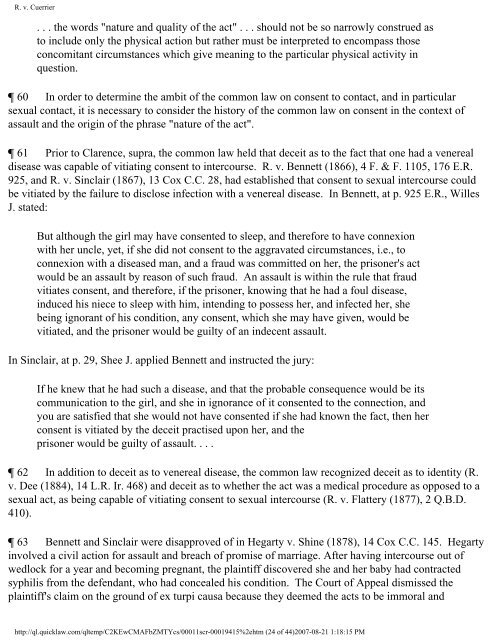
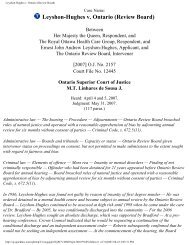
![LaFortune [LaFortunate] (Re) - British Columbia Review Board](https://img.yumpu.com/42779845/1/190x245/lafortune-lafortunate-re-british-columbia-review-board.jpg?quality=85)
